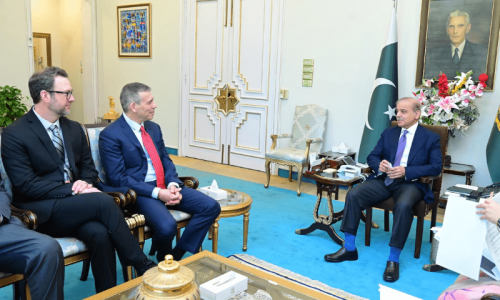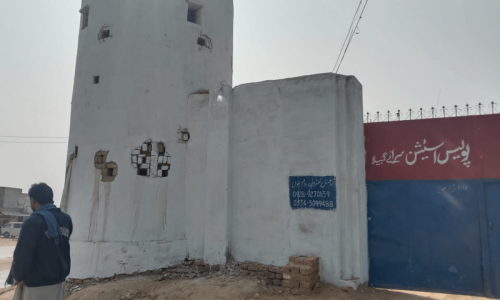KARACHI: The Sindh Assembly on Monday unanimously adopted a resolution asking the authorities for making it mandatory to write “Khatim-un-Nabiyyeen” (last prophet) along with name of Holy Prophet Hazrat Muhammad (PBUH) in official documents, books and wherever the holy name was used.
The resolution was tabled by Mohammad Hussain Khan of the Muttahida Qaumi Movement-Pakistan.
He said that since the finality of Prophethood was part of the Muslim faith, “Khatim-un-Nabiyyeen” should be written and pronounced in official documents, newspapers, magazines, television, radio and wherever this holy name was used.
Minister for Information Syed Nasir Hussain Shah of the Pakistan Peoples Party said that Aqeeda Khatm-i-Nabuwwat, ie belief in the finality of Prophethood, was an essential part of our faith. “We fully support this resolution,” he said.
All other parties including Pakistan Tehreek-i-Insaf, Grand Democratic Alliance, Tehreek-i-Labbaik Pakistan and Muttahida Majlis-i-Amal also endorsed the resolution.
The house amends rules allowing members to attend session online from their homes
Separately, a unanimous resolution, moved by Opposition Leader Firdous Shamim Naqvi, was also adopted asking the federal government to approach its Saudi Arabian counterpart for reconstruction of the mausoleum of Hazrat Sayyida Bibi Fatima.
In yet another resolution tabled by the information minister, rich tribute was paid to late scholar and academic Prof Waris Mir.
Rules amended to hold online session
Later, the house also carried an amendment in the rules of procedures moved by Parliamentary Minister Mukesh Kumar Chawla, allowing members to attend the session online from their homes or quarantine centres.
Chief Minister Syed Murad Ali Shah expressed gratitude to the entire house for approving the amendment and said that it would pave the way for members infected with Covid-19 to address the problems of their respective constituencies.
“We wanted to give them this opportunity so that they don’t have to come to the assembly and risk their lives,” he added.
The chief minister said that the provincial government would welcome suggestions and proposals from the opposition to make the online session of the assembly more effective.
He said that the speaker was empowered to hold remote session of the assembly.
The CM said that the provincial health department so far conducted Covid-19 tests of 90 MPAs of which 83 came negative and six tested positive, adding that the report of one member had yet to come.
He urged that lawmakers attending the session should be tested periodically, adding that a team would be deployed in the assembly from June 20 for screening of MPAs.
Later, he also gave a demo of online participation while addressing the lawmakers from his chamber.
He said it was the first time that such a method was introduced in Pakistan as the Sindh Assembly was the first to do so.
He also hinted at holding the entire session online, if it became difficult to hold sittings in the assembly hall in future.
Opposition Leader Naqvi rose to assure the chair of opposition parties’ full cooperation in this regard and said that online session of the assembly could be held until pandemic was controlled.
He, however, said that the proposals and suggestions of the opposition should be incorporated in holding the online session of the assembly.
The opposition leader also said that there would be need of training the lawmakers for participating in the online session.
Speaker Agha Siraj Durrani told the house that the situation in the province was not normal in view of the pandemic.
The CM said that it was not written in the assembly rules that the assembly session should necessarily be held in the Sindh Assembly Building.
Health Minister Dr Azra Fazl Pechuho said that the coronavirus situation was worsening day by day and feared that it could go to the extent when all members of the assembly would attend the sitting online.
It may be noted here that around two-dozen members of the Sindh Assembly had contracted the contagion, while Pakistan Peoples Party’s minister Ghulam Murtaza Baloch succumbed to the deadly virus.
‘Comprehensive education policy made’
Education Minister Saeed Ghani said although every walk of life was affected by the pandemic, education had been hit the hardest. “Our future is hanging in the balance,” he said.
He informed the lawmakers that the education department had made a “comprehensive” policy for provision of education to students during the pandemic.
“We are in talks with cellular companies and expanding internet facilities to less privileged areas of the province. The education department is also working on offline mobile application and have formed our YouTube channel,” he added.
During the proceedings, the house also unanimously passed eight government bills — The Stamp (Sindh Amendment) Bill, 2020; The Sindh Advisors (Appointments, Powers, Functions, Salaries, Allowances And Privileges (Amendment) Bill, 2019; The Sindh Epidemic Diseases (Amendment) Bill, 2020; The Sindh Covid-19 Emergency Relief Bill, 2020; The Sindh Shops And Commercial Establishment (Amendment) Bill, 2020; The Sir Cowasjee Jahangir Institute Of Psychiatry And Behavioural Sciences, Hyderabad Bill, 2019; The Aror University Of Art, Architecture, Design And Heritage, Sukkur, Bill, 2019; and The Shaheed Allah Buksh Soomro University Of Art, Design And Heritages Jamshoro Bill, 2020.
Published in Dawn, June 16th, 2020














































